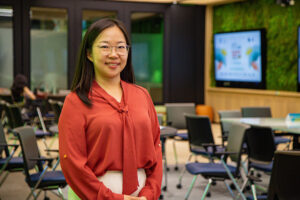
Korean education-technology firm to set up remote-work agency business in Philippines
SOUTH KOREA’s Tella, an English-language education technology company, said it is looking to set up a remote-work agency for workers in the Philippines.
“Although we’ve had made some success in the mission and the business side, we’re now looking into the next phase of diversifying our business portfolio,” Tella Co-Founder and Chief Executive Officer Yuha Jin told BusinessWorld on the sidelines of the United Nations Development Programme’s Youth Co:Lab forum last week.
Founded in 2014, Tella initially sought to provide English online tutoring jobs to Filipinos and Ugandans. It currently serves 100,000 users in 60 countries.
The expansion involves farming out remote work to users in the two countries to better serve clients in various time zones, Ms. Jin said.
“If we’re just focused on one industry (English language tutoring), there’s a limit to how many jobs that we can directly create. Whereas, if we’re the agency or the platform to connect the talent to a variety of businesses, then there can be way more opportunities,” Ms. Jin said.
Tella’s target is to support up to a million jobseekers on its platform, Ms. Jin added.
It is also looking to establish a startup accelerator to help fund, mentor and link Filipino and Ugandan digital and IT (information technology) startups with foreign investors.
“Young people have even better skill sets these days,” she said. “But in terms of entrepreneurship, like having industry insight or having network or connections, it doesn’t come at a young age.”
The Philippines, with one of the youngest working populations in the East Asia-Pacific, has a 25-year window to utilize the benefits of having an agile workforce, the World Bank has said. This will require investing in health, skills and knowledge to maximize the potential economic benefits.
“Investors or government need to know where and who to invest in — the right people and right industries,” Ms. Jin said.
Gerd Trogemann, manager of the Regional Programme and Global Policy Network at the UNDP’s Regional Bureau for Asia and the Pacific, cited the need to invest in youth-led startups.
“It is important to think about youth because it tells you where you need to make adjustments in terms of policy, regulations, and in creating opportunities for the next generation,” he told BusinessWorld separately. “Policy is not made in a vacuum; it needs to be applied in reality.” — Beatriz Marie D. Cruz



